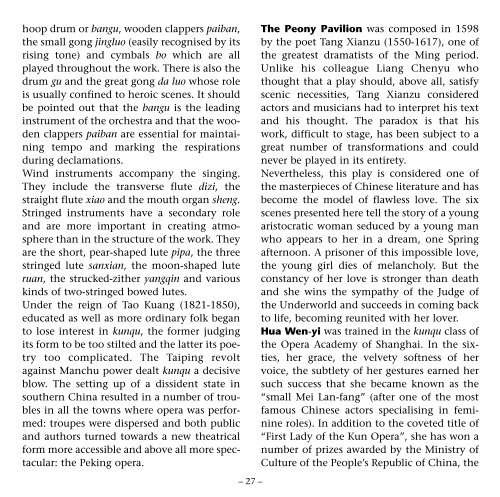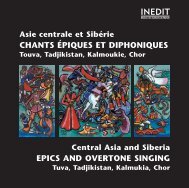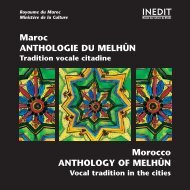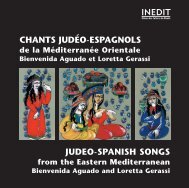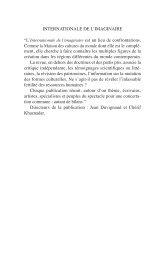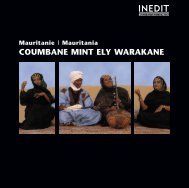le pavillon aux pivoines - Maison des Cultures du Monde
le pavillon aux pivoines - Maison des Cultures du Monde
le pavillon aux pivoines - Maison des Cultures du Monde
Create successful ePaper yourself
Turn your PDF publications into a flip-book with our unique Google optimized e-Paper software.
hoop drum or bangu, wooden clappers paiban,<br />
the small gong jingluo (easily recognised by its<br />
rising tone) and cymbals bo which are all<br />
played throughout the work. There is also the<br />
drum gu and the great gong da luo whose ro<strong>le</strong><br />
is usually confined to heroic scenes. It should<br />
be pointed out that the bangu is the <strong>le</strong>ading<br />
instrument of the orchestra and that the wooden<br />
clappers paiban are essential for maintaining<br />
tempo and marking the respirations<br />
<strong>du</strong>ring declamations.<br />
Wind instruments accompany the singing.<br />
They include the transverse flute dizi, the<br />
straight flute xiao and the mouth organ sheng.<br />
Stringed instruments have a secondary ro<strong>le</strong><br />
and are more important in creating atmosphere<br />
than in the structure of the work. They<br />
are the short, pear-shaped lute pipa, the three<br />
stringed lute sanxian, the moon-shaped lute<br />
ruan, the strucked-zither yangqin and various<br />
kinds of two-stringed bowed lutes.<br />
Under the reign of Tao Kuang (1821-1850),<br />
e<strong>du</strong>cated as well as more ordinary folk began<br />
to lose interest in kunqu, the former judging<br />
its form to be too stilted and the latter its poetry<br />
too complicated. The Taiping revolt<br />
against Manchu power dealt kunqu a decisive<br />
blow. The setting up of a dissident state in<br />
southern China resulted in a number of troub<strong>le</strong>s<br />
in all the towns where opera was performed:<br />
troupes were dispersed and both public<br />
and authors turned towards a new theatrical<br />
form more accessib<strong>le</strong> and above all more spectacular:<br />
the Peking opera.<br />
–27–<br />
The Peony Pavilion was composed in 1598<br />
by the poet Tang Xianzu (1550-1617), one of<br />
the greatest dramatists of the Ming period.<br />
Unlike his col<strong>le</strong>ague Liang Chenyu who<br />
thought that a play should, above all, satisfy<br />
scenic necessities, Tang Xianzu considered<br />
actors and musicians had to interpret his text<br />
and his thought. The paradox is that his<br />
work, difficult to stage, has been subject to a<br />
great number of transformations and could<br />
never be played in its entirety.<br />
Neverthe<strong>le</strong>ss, this play is considered one of<br />
the masterpieces of Chinese literature and has<br />
become the model of flaw<strong>le</strong>ss love. The six<br />
scenes presented here tell the story of a young<br />
aristocratic woman se<strong>du</strong>ced by a young man<br />
who appears to her in a dream, one Spring<br />
afternoon. A prisoner of this impossib<strong>le</strong> love,<br />
the young girl dies of melancholy. But the<br />
constancy of her love is stronger than death<br />
and she wins the sympathy of the Judge of<br />
the Underworld and succeeds in coming back<br />
to life, becoming reunited with her lover.<br />
Hua Wen-yi was trained in the kunqu class of<br />
the Opera Academy of Shanghai. In the sixties,<br />
her grace, the velvety softness of her<br />
voice, the subt<strong>le</strong>ty of her gestures earned her<br />
such success that she became known as the<br />
“small Mei Lan-fang” (after one of the most<br />
famous Chinese actors specialising in feminine<br />
ro<strong>le</strong>s). In addition to the coveted tit<strong>le</strong> of<br />
“First Lady of the Kun Opera”, she has won a<br />
number of prizes awarded by the Ministry of<br />
Culture of the Peop<strong>le</strong>’s Republic of China, the


